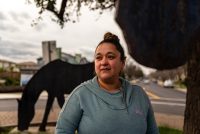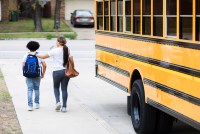Latest KFF Health News Stories
After Congress Ended Extra Cash Aid for Families, Communities Tackle Child Poverty Alone
The child tax credit passed by Congress at the height of covid has expired, but states and localities are trying to fill the gap with their own programs and funding. In Michigan, Rx Kids already covers every family with a new baby in Flint. Now, other communities aim to follow.
Paid Sick Leave Is Up for a Vote in Three States
The coronavirus pandemic underscored the importance of paid sick leave, a benefit to help workers and their families when they fall ill. Now voters in Missouri, Nebraska, and Alaska are deciding whether employers must provide it.
Black Americans Still Suffer Worse Health. Here’s Why There’s So Little Progress.
The United States has made almost no progress in closing racial health disparities despite promises, research shows. The government, some critics argue, is often the underlying culprit.
Nursing Aides Plagued by PTSD After ‘Nightmare’ Covid Conditions, With Little Help
A KFF Health News investigation reveals that employers and the government have offered nursing aides little assistance for PTSD and other ongoing maladies triggered by hazardous work during the pandemic.
What the Health? From KFF Health News: Live from Austin, Examining Health Equity
The term “health equity” means different things to different people. Beyond guaranteeing all Americans access to adequate, affordable medical care, the pursuit of equity can include addressing social determinants of health, such as housing, education, and environment. Systemic and historical racism — manifested in over-policing or contaminated drinking water, for instance — can negatively affect health. In a live taping at the Texas Tribune Festival, special guests Carol Alvarado, the Texas state Senate’s Democratic leader, and Ann Barnes, president and CEO of the Episcopal Health Foundation, along with KFF Health News’ Sabriya Rice and Cara Anthony, join KFF Health News’ Julie Rovner to discuss addressing health inequities.
Health Secretary Becerra Touts Extreme Heat Protections. Farmworkers Want More.
Health and Human Services Secretary Xavier Becerra has a plan to protect farmworkers from extreme heat and wildfire smoke, but farmworkers who pick California grapes say they need more, as climate change brings more extreme weather.
El máximo responsable de salud del país, que está barajando la posibilidad de postularse para gobernador, se ha convertido en una de las voces principales de la administración Biden sobre el cambio climático.
Native American Public Health Officials Are Stuck in Data Blind Spot
For decades, state and federal agencies have restricted or delayed tribes and tribal epidemiology centers from accessing public health data, a blackout that leaves health workers in Native American communities cobbling together information to guide their work, including tracking devastating disease outbreaks.
Maternity Care in Rural Areas Is in Crisis. Can More Doulas Help?
Rural communities are losing access to maternity care, raising the risk of pregnancy complications, especially for Black women, who face higher rates of maternal mortality. Now, a Georgia medical school is trying to help by training doulas, practitioners who offer patients extra support before, during, and after childbirth.
Journalists Discuss Abortion in GOP Platform and How Idaho’s Ban Drove Away OB-GYNs
KFF Health News and California Healthline staff made the rounds on national and local media in the last couple of weeks to discuss topical stories. Here’s a collection of their appearances.
Mississippi Lacks Black Doctors, Even as Lawmakers Increasingly Target Diversity Programs
Administrators at the University of Mississippi School of Medicine are trying to recruit more Black students — and more Hispanic and Choctaw Nation students, for that matter. But they face several obstacles, including a recent swell of Republican opposition to diversity, equity, and inclusion efforts.
Journalists Broach Topics From Treating Shooting Victims to Sunscreen Safety
KFF Health News and California Healthline staffers made the rounds on national and local media in the last couple of weeks to discuss topical stories. Here’s a collection of their appearances.
Clean Needles Save Lives. In Some States, They Might Not Be Legal.
As billions of dollars from settlements with opioid manufacturers and distributors go to state and local governments, efforts to reduce the epidemic’s harm can be hamstrung by drug paraphernalia laws. Health authorities say distributing clean syringes to users can save lives, but in states like Pennsylvania, it may be illegal.
Medicaid ‘Unwinding’ Decried as Biased Against Disabled People
People with disabilities say they are abruptly losing their Medicaid home health benefits and are being advised incorrectly when they call state offices for more information. “Every day the anxiety builds,” one beneficiary told KFF Health News.
California propone ampliar subsidios de seguros de salud a todos los inmigrantes adultos
California es el primer estado en ampliar Medicaid a todos los adultos que reúnan los requisitos, independientemente de su estatus migratorio, una medida celebrada por los activistas de la salud y por líderes políticos de todo el estado.
California Floats Extending Health Insurance Subsidies to All Adult Immigrants
The legislature is considering taking the first steps to make Covered California plans available to immigrants without permanent legal status. The state has already extended Medi-Cal coverage to low-income immigrants.
Toxic Gas Adds to a Long History of Pollution in Southwest Memphis
People across the nation claim cancer-causing emissions from local sterilizing plants are making them sick. It’s an example of environmental racism, say residents of one predominantly Black area in southwest Memphis, Tennessee, where life expectancy is much shorter than county and state averages.
En Colorado, reevalúan leyes formuladas para proteger a los menores
Hay esfuerzos en Colorado y otros estados para revertir las leyes que obligan a informar sobre sospechas de abuso o negligencia, argumentando que el resultado ha sido demasiados informes infundados, que perjudican desproporcionadamente a las familias que son pobres, negras, indígenas o tienen miembros con discapacidades.
Mandatory Reporting Laws Meant To Protect Children Get Another Look
The state is looking at ways to weed out false reporting of child abuse and neglect as the number of reports reaches a record high.
Genetics Studies Have a Diversity Problem That Researchers Struggle To Fix
Researchers in Charleston, South Carolina, are trying to build a DNA database of 100,000 people to better understand how genetics affects health risks. But they’re struggling to recruit enough Black participants.






















